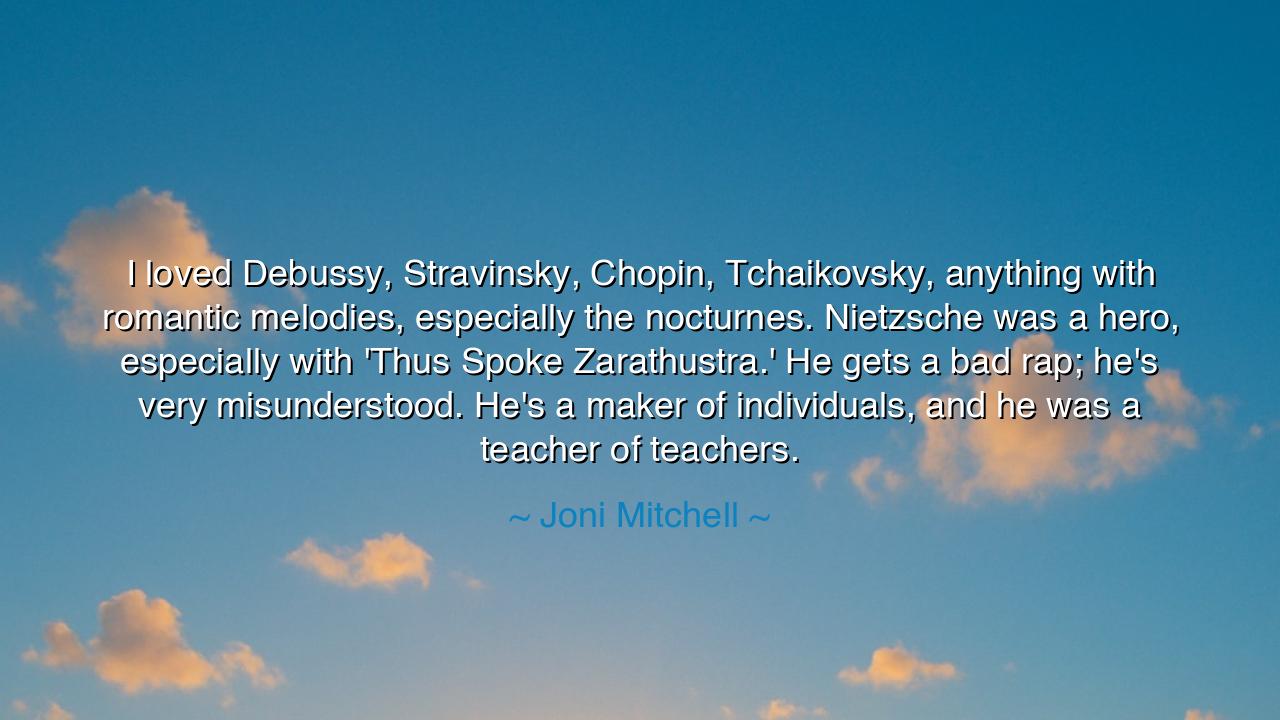
I loved Debussy, Stravinsky, Chopin, Tchaikovsky, anything with
I loved Debussy, Stravinsky, Chopin, Tchaikovsky, anything with romantic melodies, especially the nocturnes. Nietzsche was a hero, especially with 'Thus Spoke Zarathustra.' He gets a bad rap; he's very misunderstood. He's a maker of individuals, and he was a teacher of teachers.






The words of Joni Mitchell—“I loved Debussy, Stravinsky, Chopin, Tchaikovsky, anything with romantic melodies, especially the nocturnes. Nietzsche was a hero, especially with Thus Spoke Zarathustra. He gets a bad rap; he's very misunderstood. He's a maker of individuals, and he was a teacher of teachers”—are not mere reminiscence, but a testament to the sacred bond between art, philosophy, and the soul. In them lies the recognition that music and thought, melody and wisdom, weave together to shape the deepest core of human identity. Mitchell speaks as one who drank from the fountains of both harmony and reason, seeing in them not separate streams, but a single river of beauty and truth.
The origin of this insight rests in the human longing for transcendence. Composers such as Debussy, Stravinsky, Chopin, and Tchaikovsky gave to the world not only notes upon a page, but windows into the infinite. Their romantic melodies, tender or tempestuous, spoke directly to the heart, bypassing the rigid armor of intellect. The nocturnes, in particular, were like whispers of eternity—songs of twilight and yearning that reminded listeners of the vast mystery within themselves. At the same time, the philosopher Nietzsche dared to pierce through tradition and proclaim the birth of the self-made soul. His Zarathustra did not bow to custom but called forth the individual as creator, builder, and teacher of teachers. Mitchell saw in both music and philosophy the same lesson: that life is not to be passively received, but consciously composed.
Consider the life of Chopin, who, though plagued by illness and exile, poured his inner world into the keys of the piano. His nocturnes, fragile yet eternal, spoke of longing and resilience. They taught that even suffering can yield beauty when shaped by artistry. Likewise, Nietzsche, often cast as a prophet of despair, was in truth a prophet of transformation. His cry of the Übermensch was not a call to domination, but to liberation—to create values when old ones crumble, to rise above mediocrity and live with fire. Like Chopin’s melodies, Nietzsche’s words were misunderstood, yet both point toward the same heroic path: to fashion one’s soul anew.
The emotional power of Mitchell’s quote comes from the fusion of these two realms: the romantic music that revives the heart and the radical philosophy that awakens the mind. In the marriage of the two, one finds the complete nourishment of the human being. For what use is melody without meaning? And what use is philosophy without beauty? Together, they make the spirit whole, calling it to both tenderness and strength, both reverence and defiance.
Her words also hold a warning. Too often, society diminishes both the artist and the philosopher, branding them as dreamers, eccentrics, or even threats. Nietzsche, she reminds us, “gets a bad rap.” He has been misunderstood, vilified, and reduced to caricature. Yet this is the fate of all who challenge convention, whether through notes or words. Debussy was scorned by critics who could not grasp his freedom of form. Stravinsky’s Rite of Spring provoked riots. Nietzsche’s works were twisted by those who sought to use them for power rather than freedom. But the rejection of the crowd does not erase the truth of their gift.
From this arises the lesson: we must seek the truth behind appearances, the melody behind the noise, the essence behind the distortion. When great minds are misunderstood, let us be among those who listen deeper. When great works are mocked, let us be those who return to them with open hearts. In music, let us allow the romantic melodies to soften us; in philosophy, let us allow the boldness of Zarathustra to strengthen us. Only by embracing both tenderness and courage can we become whole individuals.
What then shall we do? Let us cultivate lives where art and thought walk hand in hand. Listen to the nocturnes in silence, and feel the stirring of the eternal within. Read Nietzsche not as a cynic but as a guide, urging us to rise above fear. Support artists and teachers, for they are the ones who keep alive the fire of imagination and wisdom. And above all, let each of us become, in our own way, “a maker of individuals”—helping others to awaken, to create, to live boldly and beautifully.
Thus, Joni Mitchell’s words, though spoken of her loves and heroes, become a teaching for generations. The musician and the philosopher, though they seem to belong to different worlds, in truth belong to the same one: the realm of the soul’s ascent. To honor them is to honor the spark within ourselves, the spark that longs not merely to survive, but to sing, to think, and to become.






AAdministratorAdministrator
Welcome, honored guests. Please leave a comment, we will respond soon